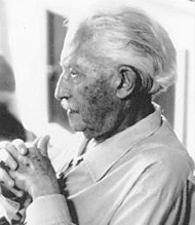German psychoanalyst Erik Erikson is best known for his groundbreaking theories about the psychosocial stages of development, for coining the term “identity crisis,” and for debunking the Freudian idea that childhood sets the course for personality development.
Erik Erikson’s Early Days
Erik Erikson was born on June 15, 1902, in Frankfurt, Germany, to Karla Abrahamsen, a single mother, who’d had an affair during her husband’s four-year absence. Three years later, Erikson’s pediatrician, Theodor Homburger, married Karla and adopted Erik.
As a student, Erikson was more interested in art than science. After finishing high school he skipped college and traveled to Italy to further develop his passion and talent for art. He then moved to Vienna to teach art at a school for gifted children created by Sigmund Freud’s daughter, Anna Freud, and Dorothy Burlingham. Observing his talent with children, Anna Freud guided him toward a career in psychoanalysis.
Sources in this Story
- Frostburg State University: PSYography: Erik Erikson
- Erikson Institute: Erik H. Erikson
- Time: The Stages of Man
- The Learning Place Online: The Developmental Stages of Erik Erikson
- New York Times: Erik Erikson, 91, Psychoanalyst Who Reshaped Views of Human Growth, Dies
Erikson’s Contributions to Psychoanalysis
In “Childhood and Society,” Erikson expanded on the Freudian concept of stages of development, extending them into one’s entire life. Explaining the significance of his work, Time wrote, “Psychoanalysts could [now] look cultural anthropologists or social psychologists in the eye and start sharing observed knowledge.”
Erikson broke with Freudian thought by suggesting “that children more than five years old are not irrevocably molded and that those who are poor in their early years can later make up for their deprived background.”
Arlene Harder, psychotherapist and editor of “The Learning Place,” surveyed the eight stages of psychosocial development, writing, “[Erikson] felt the course of development is determined by the interaction of the body (genetic biological programming), mind (psychological), and cultural (ethos) influences.”
As we mature, we pass through theses stages or conflicts, which we must grapple with and then resolve.
The Rest of the Story
Erikson’s fears about the rise of the Nazis compelled him and his wife, dancer Joan Serson, to move to the United States in the early 1930s. Though he only had a high school diploma, he found a post at Harvard. Encouraged by academics there to obtain his Ph.D., he quit after a brief attempt, explaining he could learn more by simply observing children: “You can see how he solves his problems. You can also see what’s wrong. Young children, especially, have enormous creativity, and whatever’s in them rises to the surface in free play.”
Erikson studied the behavior and development of various societies, and examined how various racial, economic and political problems (such as the threat of nuclear war) affected American culture. He authored several books, including bestselling psychobiographies of Martin Luther and Gandhi. Erikson died at age 91, on May 12, 1994, in Harwich, Massachusetts.
This article was originally written by Shannon Firth; it was updated May 19, 2017.











